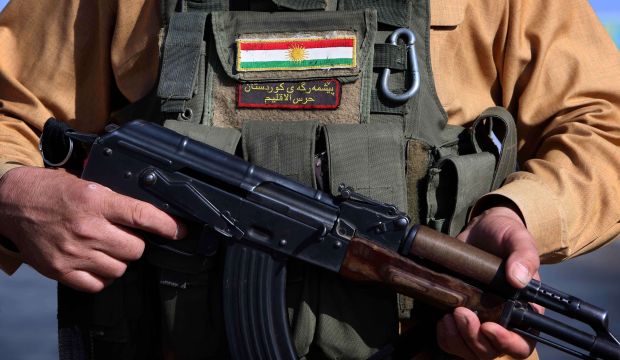
Iraqi Kurdish Peshmerga fighters take position on the front line in Khazer, near the Kurdish checkpoint of Aski Kalak, 25 miles (40 kilometers) west of Erbil, the capital of the autonomous Kurdish region of northern Iraq, on August 8, 2014. (AFP/Safin Hamed)
Erbil, Asharq Al-Awsat—Islamic State of Iraq and Syria (ISIS) fighters currently pose no threat to the Kurdish capital Erbil, as Peshmerga forces continue to drive Islamist fighters out of Iraq’s semi-autonomous region, a Peshmerga official said.
Speaking to Asharq Al-Awsat, Peshmerga Ministry spokesman Col. Holgurt Hikmet said: “Peshmerga forces have made significant progress in the Khazer region, driving back ISIS as far as possible from Erbil and liberating five villages north of Mosul.”
The Peshmerga spokesman confirmed Kurdish forces had received additional heavy weaponry to aid them in the fight against ISIS. “Peshmerga forces already possessed some heavy weaponry, but we have received additional arms as part of international military assistance,” he said.
Col. Hikmet said the Peshmerga had opened a number of new battlefronts with ISIS fighters, but refused to divulge further details, citing operational security.
Earlier this week, Peshmerga forces launched a major offensive in Iraq’s Khazer region, which is located between Mosul and Erbil. ISIS managed to gain control of a number of villages in the region, but the Peshmerga forces drove them westwards and away from the borders of the semi-autonomous region, liberating along the way seven Christian villages that had been captured by group’s forces.
Tens of thousands of Iraqi Chaldean Christians had fled the ISIS advance amid fears of sectarian violence. Although the Peshmerga forces have restored control of the villages, it is unclear if any of Iraq’s Christians will be willing to return given the changing situation on the ground in northern Iraq.
A Peshmerga source, speaking to Asharq Al-Awsat on the condition of anonymity because he was not authorized to brief the media, confirmed that Kurdish forces shelled the area before advancing to confront ISIS forces.
The source added that ISIS had changed their tactics in response to US air strikes on their positions, splitting up their forces into smaller mobile strike forces to avoid detection and reduce the number of casualties inflicted by each air strike.
ISIS remains in control of the northern city of Mosul despite Peshmerga advances and increased US air strikes. Speaking on Tuesday, the US military’s most senior officer did not rule out a deeper ground role for US troops if Kurdish and Iraqi forces sought to liberate Mosul.
“If the Iraqi security forces and the Kurdish Peshmerga were at some point ready to retake Mosul, a mission that I would find to be extraordinarily complex, it [US troops] could very well be part of that particular mission to provide close combat advising or accompanying for that mission,” the chairman of the Joint Chiefs of Staff, Gen. Martin Dempsey, told the Senate Armed Services Committee.
